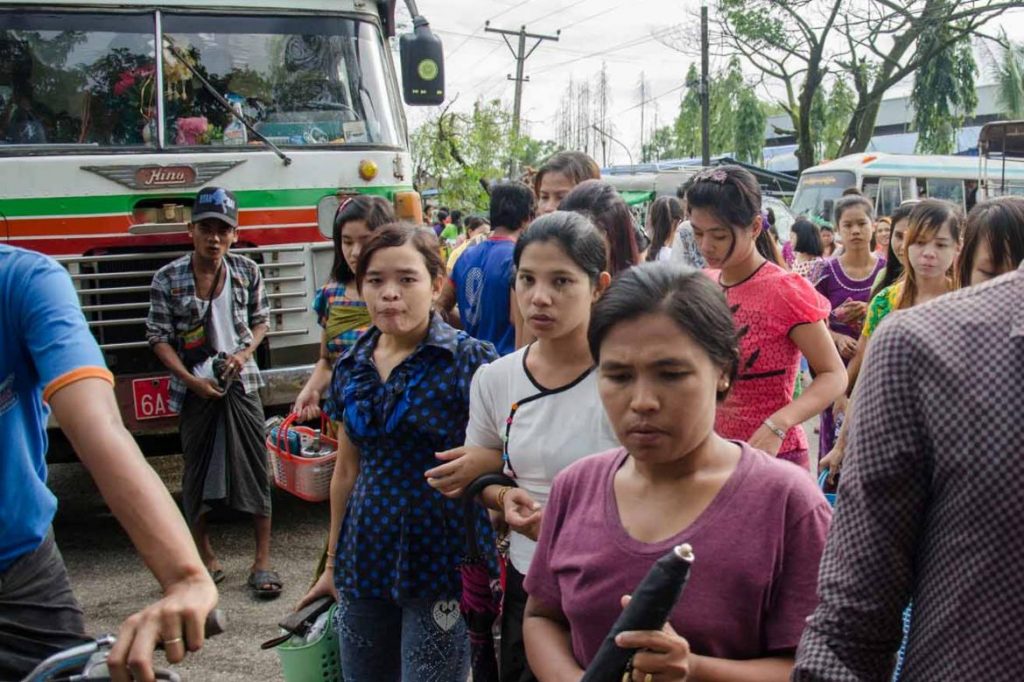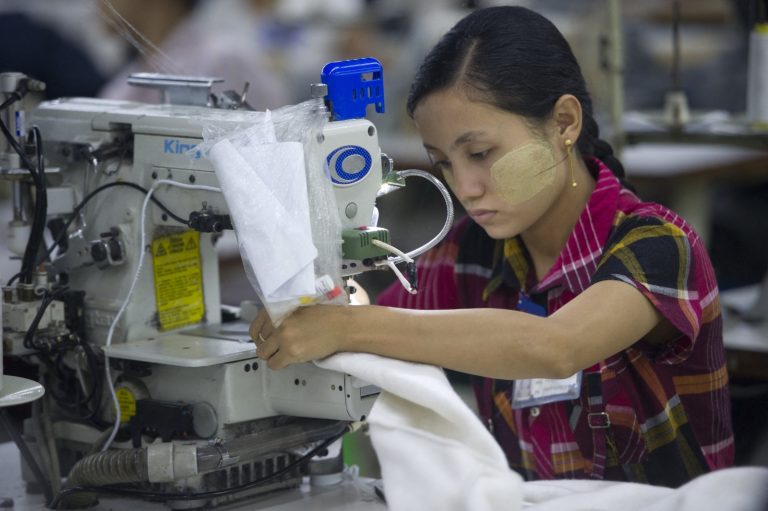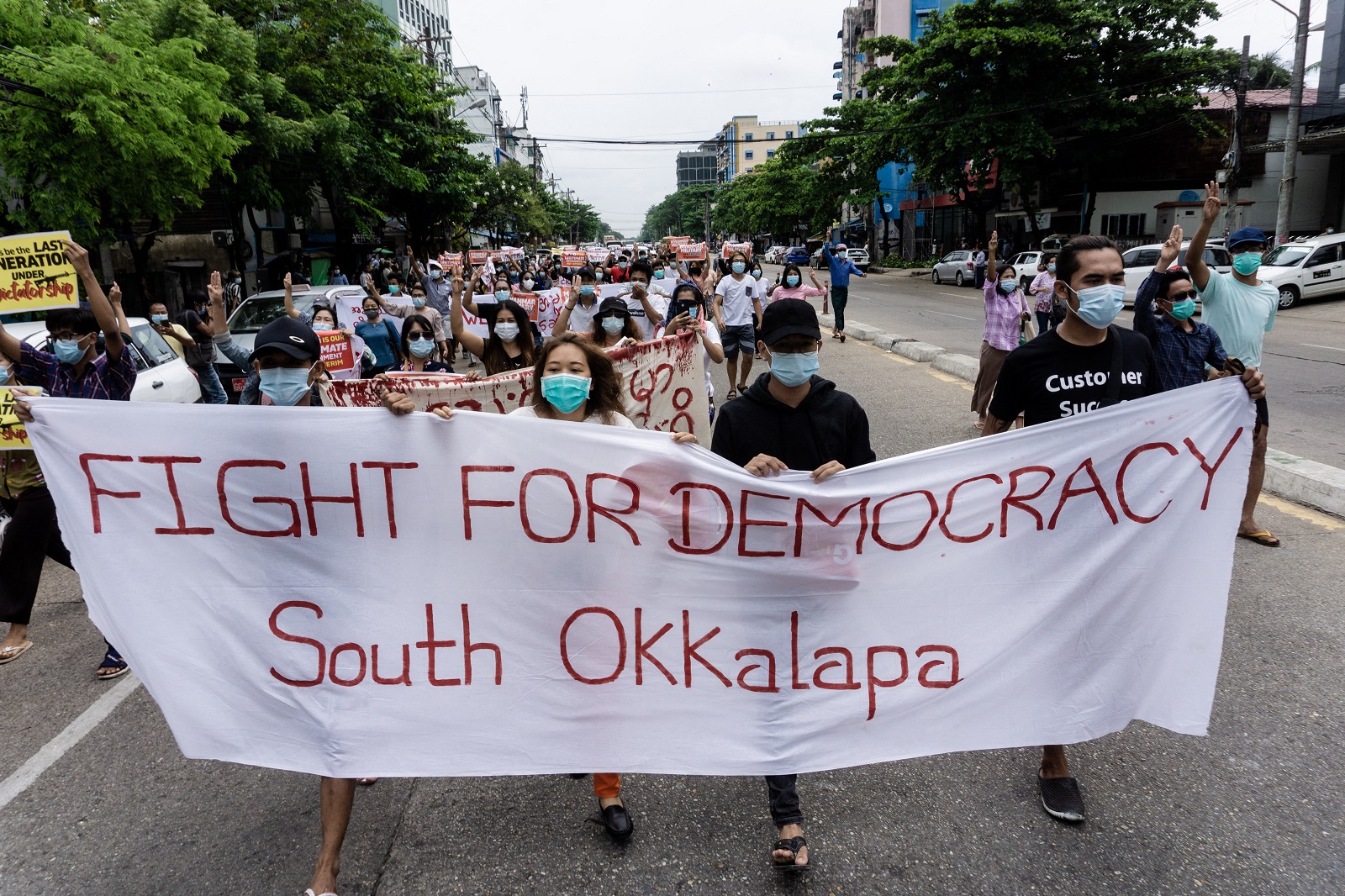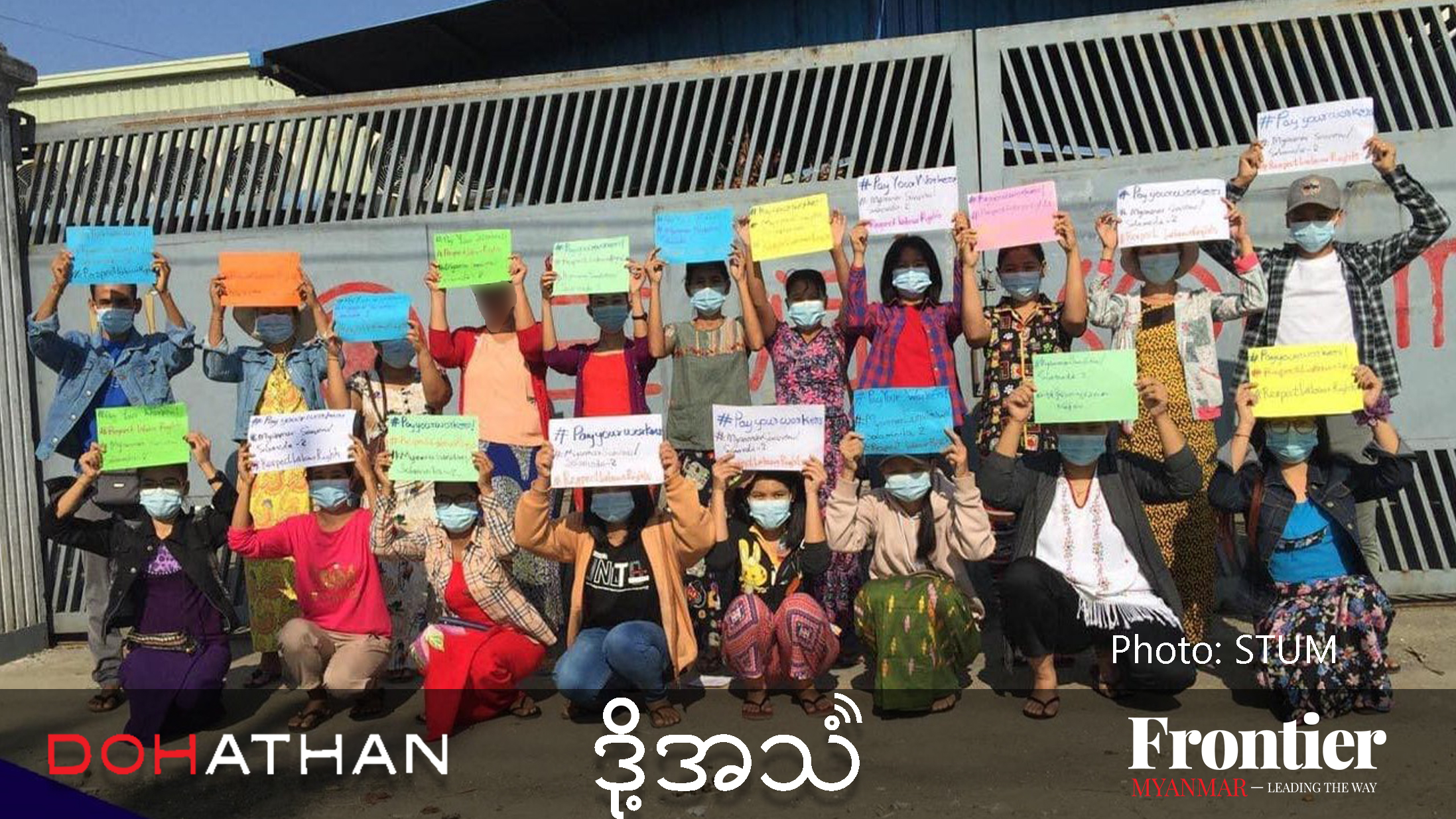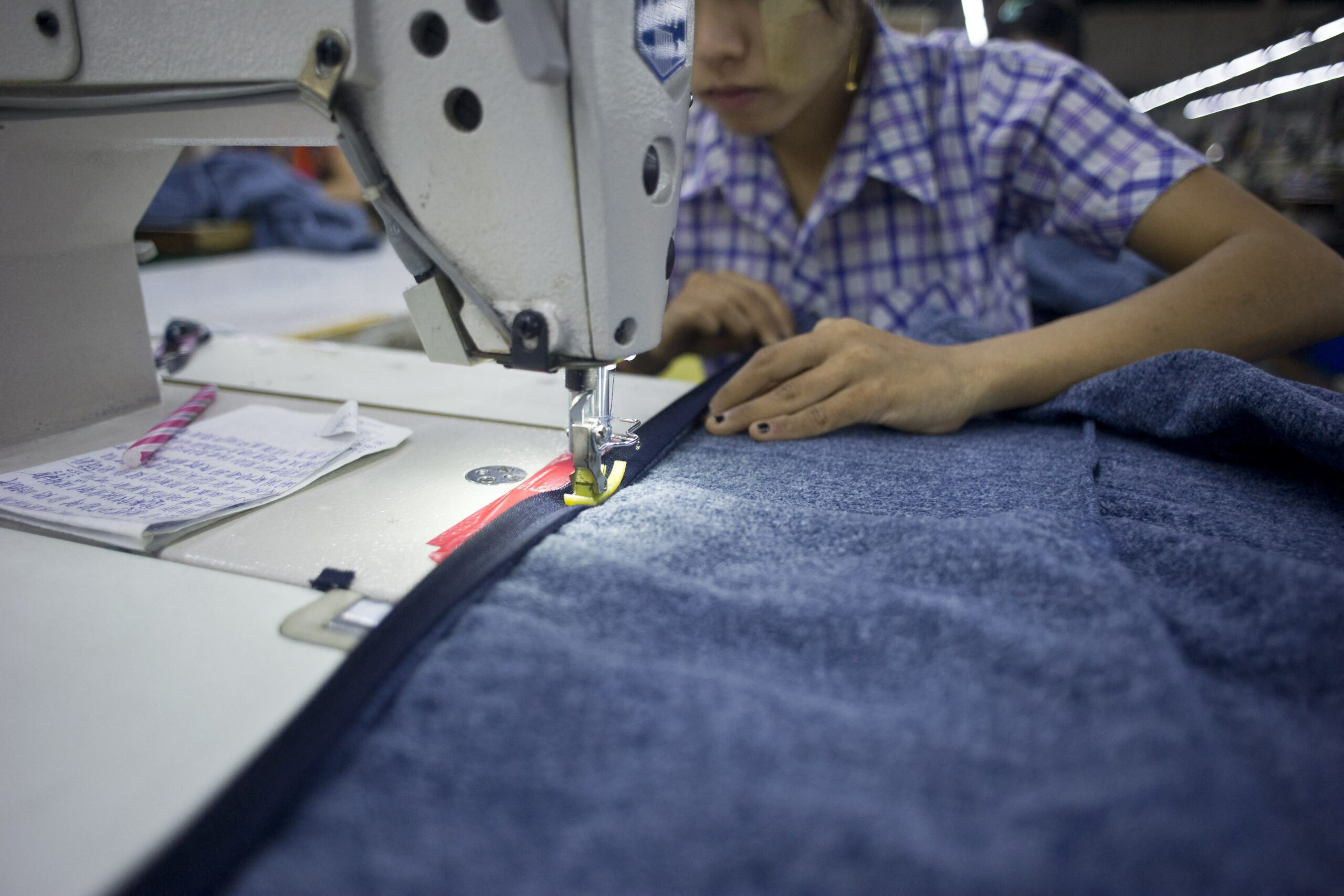Infighting has increasingly defined the labour movement since trade unions were legalised in 2012 and a recent election has further divided this already fractious area of local civil society.
By CHARLES MICHIO TURNER | FRONTIER
IN JULY 2016, members of the union movement held a vote to choose representatives on the Arbitration Council, a body similar to a federal court with a remit to resolve conflicts between employees and employers.
The new representatives were to take up their positions in October. But more than six months after the vote, massive protests from disgruntled unions have prevented them from doing so. The incumbent members remain in their positions on the council, beyond their two-year terms, thanks to a “temporary extension”.
The election has widened already deep fissures within the labour movement, with many declaring the vote illegitimate and accusing the country’s largest union of controlling the outcome.
“There are a lot of protests about this election, and things will escalate if the new people come into power. We are prepared to handle [arbitration] ourselves instead of these strangers,” said U Naw Aung, who leads the Myanmar Industry and Craft Federation.
Support more independent journalism like this. Sign up to be a Frontier member.
Naw Aung is one of the union leaders who walked out of the election in Shwe Pyi Thar township and considers the official winners to be illegitimate. He and others allege that unions were not given proper notice on the time and place of the July vote.
“No one knew this election was happening – only 10 percent of unions attended,” he said. “There were advertisements for the election on Skynet and a few newspapers, but no one knew to look for this information.”
The election matters because the Arbitration Council offers workers their final legal hearing over issues like denied wages, severe injury or termination without proper cause. The council – which comprises representatives of business owners, government officials and workers – decides if a worker is deserving of compensation or reinstatement. The 15-person council adjudicates cases that were appealed in lower arbitration courts, at the township and region levels.
According to several union members, formal invitations were only mailed to unions that took part in the previous election, in 2014, meaning that newer organisations or those that didn’t participate last time were not informed directly of the vote.
The Ministry of Labour, Immigration and Population has organised both elections since the Arbitration Council was established under the Settlement of Labour Dispute Law enacted in 2012. It is unclear if the invitation process has changed since two years ago. The ministry could not be reached for comment.
Union infighting
Those who boycotted the election results are also troubled that the newly elected representatives all have connections to the largest union in the country, the Confederation of Trade Unions of Myanmar. The CTUM represents over 33,000 industrial and craft workers but other unions tend to perceive it as a rival rather than ally.
The recent election has added to the division. “I suspect that CTUM and the ministry hosted these elections together and they helped each other in some way,” Naw Aung said.
The recently elected representatives fiercely deny that they manipulated the election in any way. One of them, U Ye Kyaw Thu who was once employed by CTUM as a recruiter, said he is eager to begin his term on the Arbitration Council and prove that the hostility he has faced is unwarranted.
“The Ministry of Labour asked for CTUM’s help in holding the election, but only in a supportive way because [CTUM] have the most organising experience,” Ye Kyaw Thu told Frontier. “With many members, it is natural [for CTUM] to have more representation [on the Arbitration Council].”
His fear is that the election is being used to divide an already fractured labour movement. There are well over 1000 different unions – technically known as “labour organisations” – in Myanmar, the vast majority of which operate independently from one another.
ye_kyaw_thu_arbitration_council_election_frontier.jpg
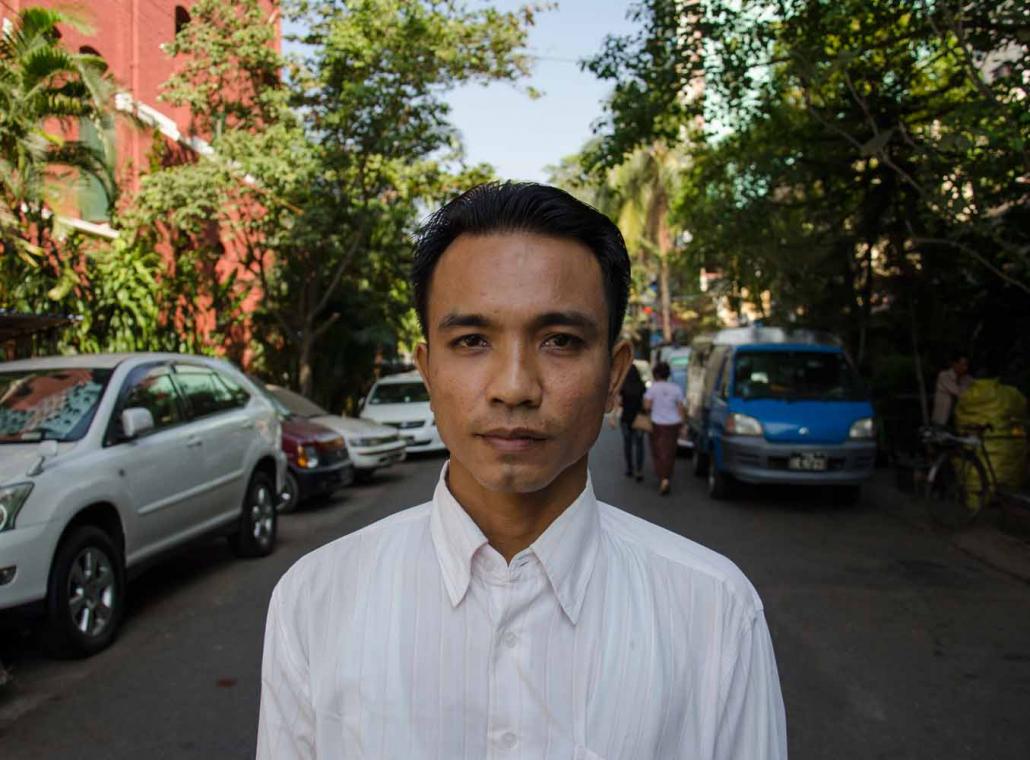
U Ye Kyaw Thu won a seat on the Arbitration Council at an election in July 2016 but is still waiting to take up his position on the body. (Charles Michio Turner | Frontier)
Aside from infighting between labour leaders, unions have struggled to establish formidable coalitions like CTUM. In fact, CTUM is the only trade union federation to be officially registered under the law, a status granted by the ministry during U Thein Sein’s transitional government.
With little coordination between the unions, there is no reliable data on just how much of the workforce is unionised.
As labour leaders struggle to organise more members – often against the wishes of employers – Ye Kyaw Thu is disheartened by how much smaller unions target CTUM instead of cooperating with it.
“Factions in unions will always happen, but these leaders who are upset must realise that most workers don’t understand the complexities of labour politics, they don’t understand that better working conditions are achieved when we are united,” he said.
He believes that CTUM can be the umbrella organisation that unites labour toward comprehensive policy reform. He admits, though, that CTUM has a “damaged public image” as a result of the Arbitration Council election, because many union members believe that the group colluded with the ministry to get its members elected.
An unnecessary election?
The arguing over the Arbitration Council election suggests that labour rights activists may have misunderstood the Settlement of Labour Disputes Law.
The law is regularly criticised for having lax enforcement mechanisms: an employer can ignore a ruling and instead pay a fine of up to K1 million. There have been regular calls to strengthen this penalty, including the introduction of prison terms, but so far lawmakers have resisted.
Unions are beginning to realise that they also have limited control over the makeup of the Arbitration Council. Despite the allegations of voter suppression and collusion, the July election violated no laws or protocols. In fact, there is no mention in the law about an election being held to select representatives.
“The law says that members of Arbitration Council will only be recommended by labour organisations,” said Ms Natsu Nogami, a former senior legal adviser with the International Labour Organization who observed the 2016 election.
The law gives the Ministry of Labour, Immigration and Population ultimate control over who is selected to sit the Arbitration Council.
With no legal recourse, labour leaders outside of CTUM have relied on protests in hopes of mounting public pressure to influence the ministry. In September 2016, over 1000 factory workers marched in Mandalay to draw attention to the conduct of the election. Smaller demonstrations have been held since then but with decreasing frequency. Many activists fear that it’s only a matter of time until the protesters go home and the new Arbitration Council is sworn in.
Arbitration Council member U Htay, who is entering the fourth month of his “temporary extension”, also opposes the election results. He hopes that the unrest continues to keep out the new representatives but also knows that disgruntled union leaders may soon be forced to accept the election results.
“The ministry wants to approve the new people, so I don’t think another election is on the horizon. I am on a temporary term, I will have to leave once the ministry tells me to,” he said.
He said the Ministry of Labour would host a meeting in Nay Pyi Taw on February 22 between recently elected members and the incumbents – the first gathering of its kind since the election – in an effort to break the deadlock. But there’s little optimism that a settlement will be reached. For now, the goal is simply to get both sides talking.
“We will only share our experiences in this meeting and listen to each other. The minister might attend too, which could be helpful. So we will see how it goes,” U Htay told Frontier shortly after speaking to ministry officials.
While they face heavy criticism, the labour leaders elected in July are eager to prove themselves as strong advocates for worker rights. “We are not puppets of any group,” said U Maung Maung Aye, another elected representative. “My goal is to bring justice in all endeavors of the arbitration council, like those before me.”
Additional reporting Htun Lyn Zaw. TOP PHOTO: Workers employed at the York garment factory, which produces clothing for H&M, head for home following an overtime shift. (Charles Michio Turner | Frontier)


